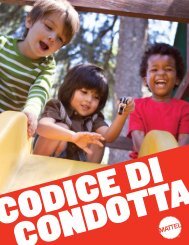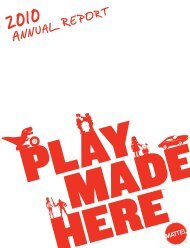2009 Global Citizenship Report - Mattel
2009 Global Citizenship Report - Mattel
2009 Global Citizenship Report - Mattel
You also want an ePaper? Increase the reach of your titles
YUMPU automatically turns print PDFs into web optimized ePapers that Google loves.
Recalls Involving Magnets<br />
Magnets are used in certain toys to enhance play features<br />
that are very engaging to children. Most magnets used in<br />
toys are low-power, traditional magnets. However, some<br />
toys designed for older children use small, more powerful<br />
“rare earth” magnets. The increased power and smaller<br />
size of these magnets increases product functionality. In<br />
late 2005 and 2006, safety concerns were raised about<br />
the potential of magnets coming loose from toys and<br />
children swallowing them. The risk of injury could occur<br />
if multiple magnets are swallowed within a sufficient<br />
interval of time that enables them to attract one another<br />
through intestinal walls and create an obstruction. The<br />
likelihood of this occurring is extremely slim, but the<br />
consequences can be serious.<br />
In response to these concerns, the Safety Standards and<br />
Technical Committee of the TIA, in conjunction with the<br />
ASTM, convened a panel of experts to review this issue<br />
and then developed a more stringent magnet safety<br />
standard. <strong>Mattel</strong> employees played a prominent role on<br />
the panel, which included representatives from consumer<br />
groups, government and other manufacturers. In<br />
January 2007, <strong>Mattel</strong> adopted the new ASTM standard<br />
for all magnet toys across all of our brands—five months<br />
before it was officially published as the industry standard.<br />
We also improved the design of the magnet retention<br />
systems to ensure that “rare earth” magnets used in<br />
future toys would be securely locked-in.<br />
After developing this new magnet retention system, we<br />
reevaluated our pre-2007 toys that contained these<br />
magnets. We found that some of our toys did not meet<br />
the proactive goals of this new standard. This led us to<br />
notify the CPSC and other regulatory authorities of<br />
our decision to initiate a voluntary worldwide recall of<br />
approximately 22.7 million toys manufactured between<br />
2002 and 2006. In effect, the recall applied the new ASTM<br />
safety standard retroactively to toys that were made<br />
before the panel was even convened.<br />
We believe that applying the 2007 ASTM Magnet<br />
Safety Standard retroactively was the right thing to<br />
do. To our knowledge, no other toy company<br />
retroactively applied the new standard.<br />
Disposal of Recalled Product<br />
We are committed to the proper management of recalled<br />
products, including those that were retuned to the<br />
company or quarantined prior to distribution. In the U.S.,<br />
all returned products are being held in warehouses until<br />
we are sure they are no longer needed for our own<br />
investigation or for legal reasons. We are exploring ways<br />
to separate and recycle parts of the products, including<br />
plastic resins, batteries and paper packaging. In some<br />
cases the sorting of these materials for recycling is<br />
required—for example battery recycling in California.<br />
Outside of the U.S., Canada and Venezuela, all affected<br />
products have been disposed of in accordance with<br />
applicable laws.<br />
Case study:<br />
ALERTING CONSUMERS DURING A RECALL<br />
In collaboration with the U.S. Consumer Product<br />
Safety Commission (CPSC), <strong>Mattel</strong> swiftly<br />
communicated to consumers and retailers about<br />
the product recalls and the process for returning<br />
affected toys, including measures that go beyond<br />
required protocols. To reach consumers around<br />
the world we took the following steps:<br />
• Developed Web-based resources to help<br />
consumers in the U.S. and Canada easily search<br />
for and identify affected toys. As a result of this<br />
increased capability, our service Web site was<br />
able to respond to an estimated 95 percent<br />
of consumer inquiries. For consumers outside<br />
North America, we created an online tool,<br />
accessible in more than 20 different languages,<br />
which provided directions on how to contact<br />
a local <strong>Mattel</strong> representative.<br />
• Provided information through our toll-free,<br />
multilingual, interactive phone line about the<br />
affected toys<br />
• Issued press releases, in addition to those<br />
released by the CPSC, to publicly alert consumers<br />
• Granted numerous television and print interviews<br />
to speak directly about the recalls<br />
• Placed advertisements in major newspapers and<br />
on various Web sites worldwide<br />
• Produced and displayed prominently on the<br />
<strong>Mattel</strong> Web site three videos in which our CEO<br />
addressed recalls and spoke directly to consumers<br />
and other stakeholders<br />
PROMOTING FAIR AND JUST WORKING CONDITIONS<br />
While <strong>Mattel</strong> directly employs a large workforce in our<br />
factories, the manufacturing of our products affects<br />
thousands more who are employed by our vendors that<br />
operate their own factories. Additionally, thousands<br />
work at licensee factories that produce products<br />
bearing our brands. We strive to ensure that our products,<br />
as well as licensed products, are manufactured in<br />
a responsible and ethical manner. We continue to evolve<br />
our standards and oversight processes to reflect our<br />
expectations for fair labor practices and environmental<br />
stewardship.<br />
This section details:<br />
• GMP audit findings and how we have addressed them<br />
• Results of external audits<br />
• Our approach to external auditing moving forward<br />
REGIONAL RECOGNITIONS<br />
• Caring Company Award 2006, 2007 and 2008<br />
awarded to <strong>Mattel</strong> Asia Pacific Sourcing, Hong<br />
Kong. (Presented by the Hong Kong Council of<br />
Social Service)<br />
• CSR Program Implementation Award <strong>2009</strong><br />
awarded to <strong>Mattel</strong> Indonesia. (Jababeka<br />
Industrial Estate, ranked first among more<br />
than 700 companies operating in the industrial<br />
manufacturing zone)<br />
18 | OUR TOYS 19 | GLOBAL CITIZENSHIP REPORT<br />
While we have begun the process of incorporating GMP<br />
audit elements into our new QMS, we have continued to<br />
conduct internal GMP audits of our factories and vendors.<br />
<strong>Mattel</strong>’s GMP include standards for the following:<br />
1. Management Systems<br />
2. Wages and Working Hours<br />
3. Age Requirements<br />
4. Forced Labor<br />
5. Discrimination<br />
6. Freedom of Expression and Association<br />
7. Living Conditions<br />
8. Workplace Safety<br />
9. Health<br />
10. Emergency Planning<br />
11. Environmental Protection<br />
GMP audits include an assessment of many social and<br />
environmental factors. We pay particular attention to zero<br />
tolerance issues (minimum age requirements for workers<br />
and free will employment), as well as wages and working<br />
hours, living conditions and clear access to emergency<br />
exits. <strong>Mattel</strong>’s GMP requires that a factory address a zero<br />
tolerance finding immediately and that other findings be<br />
corrected according to an agreed timeline.






